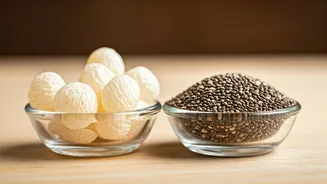Fiber's Power Revealed
Fiber, a crucial element of a healthy diet, is the focus of this comparison between isabgol and chia seeds. Both are celebrated for their high fiber content,
but they differ in composition and the effects they have on the body. This examination aims to clarify which option is best suited for different health needs, considering their impact on weight management, digestive health, and other health markers. The information provided here intends to help the reader in making an informed choice when deciding on their fiber intake to improve overall well-being. Fiber's benefits are numerous, including aiding digestion and assisting in maintaining stable blood sugar levels. Incorporating either of these seeds into your diet could be a positive step toward better health.
Feeling Full, Longer
Satiety, or the feeling of fullness, is significantly impacted by fiber consumption, and both isabgol and chia seeds play a role in this. These seeds absorb water and expand in the stomach, promoting a sensation of fullness. This effect can be particularly helpful for weight control, as it reduces the likelihood of overeating. By feeling fuller for longer, individuals may find it easier to manage their calorie intake, which in turn could lead to weight loss or maintenance. The viscosity created in the digestive system by fiber slows the absorption of nutrients, contributing to sustained energy levels and potentially curbing cravings. Understanding the satiety effects of these seeds can assist in strategic dietary planning.
Bowel Movement Harmony
Regular bowel movements are essential for digestive health, and fiber is a key element for their maintenance. Both isabgol and chia seeds offer benefits related to bowel regularity. Isabgol is particularly effective as a bulk-forming laxative due to its high soluble fiber content, which helps to soften stools and ease passage. Chia seeds also contribute to regularity, though in a slightly different manner, combining both soluble and insoluble fiber. The insoluble fiber adds bulk to the stool, promoting more frequent bowel movements. By integrating either of these seeds into the daily diet, people may reduce constipation issues and maintain a healthy digestive system. Consider how each interacts with your body to find which suits you best.
Beyond Fiber: Nutrition
The nutritional value of chia seeds and isabgol extends past their fiber content, as both provide additional health benefits. Chia seeds are a powerhouse of essential nutrients, including omega-3 fatty acids, antioxidants, and several minerals like calcium and magnesium. Omega-3s support heart health and reduce inflammation, while antioxidants protect against cellular damage. Isabgol, on the other hand, is mainly valued for its fiber, though it also contains trace minerals. The secondary nutrients found in each can provide benefits beyond what’s offered by fiber alone, contributing to overall well-being. Assessing the total nutritional profile can help determine which seed might better align with other dietary needs and goals, such as increasing omega-3 intake or diversifying mineral sources.
Blood Sugar Management
The impact of fiber on blood glucose control is another crucial aspect to consider. Fiber, especially soluble fiber, slows down the absorption of sugar from food into the bloodstream. This can help prevent spikes and crashes in blood sugar levels, making it beneficial for individuals with diabetes or those looking to manage their blood sugar. Chia seeds, with their combination of soluble and insoluble fiber, contribute to this effect. Isabgol also works similarly, aiding in blood sugar stability. By incorporating these seeds, individuals can improve insulin sensitivity and support more balanced energy levels throughout the day. This stabilization also contributes to better overall metabolic health.
Cholesterol: A Balancing Act
Fiber plays a positive role in managing cholesterol levels. Soluble fiber, found in both isabgol and chia seeds, has been shown to bind with cholesterol in the digestive tract, aiding in its removal from the body. This can help lower LDL (bad) cholesterol levels, thus promoting heart health. By reducing cholesterol absorption, these seeds can contribute to a decreased risk of cardiovascular diseases. For people worried about their cholesterol levels, integrating these fiber-rich seeds into their diet can be a valuable approach. Regular consumption, coupled with other heart-healthy lifestyle choices, can improve cholesterol profiles and support a healthier cardiovascular system.
Cautions and Considerations
While isabgol and chia seeds offer several health benefits, it's vital to be aware of the precautions and safety considerations before adding them to your diet. When increasing fiber intake, it's vital to stay well-hydrated to avoid potential digestive discomfort, such as bloating or gas. People with specific medical conditions or those taking medications should seek advice from a doctor before introducing these seeds. Isabgol may impact medication absorption, hence it's best to consume it separately from prescription drugs. Starting with smaller amounts and gradually increasing the intake helps the body adjust to the higher fiber content. Awareness of any potential side effects and proactive health management are essential.





















